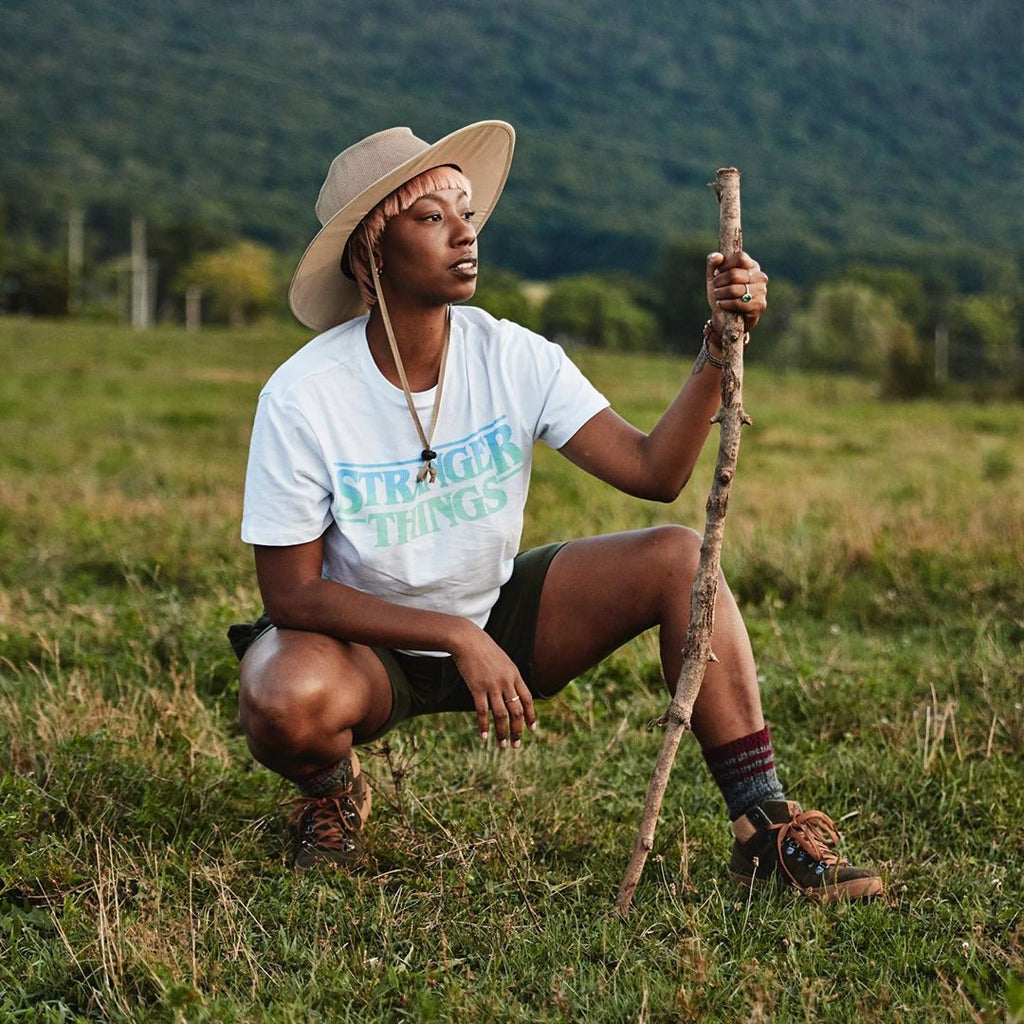Dominique Drakeford is a sustainable style and social justice visionary and educator. A thought-leader whose passion lies in disrupting unsustainable systems, she does this all while simultaneously celebrating her Blackness.
In between hosting a new podcast The Root, a 5 part series that looks at how large systems of inequality impact sustainable fashion agendas— we caught up with Dominique to see how she incorporates Super Leakproof Underwear into her sustainable lifestyle, learn why she's redefining sustainability, and relearn the 4 R’s of recycling. Meet Dominique.
Hi Dominique! You have a long-time background of environmental education and advocacy, particularly in the fashion industry. What initially drew you to this?
I grew up loving fashion! I was an avid thrift shopper, loved urban street culture and always frolicked in my mom and grandma’s closet. I grew up being an environmental nerd. I was an avid backpacker and hiker, took BIPOC youth to the outdoors on educational outdoor trips, was on a review board for outdoor recreation based nonprofits and just overall loved the wilderness.
I’ve always been a unique individual and that includes merging my passions together (fashion & nature & youth development) to create a career that heals both myself and the planet. My path shifted a few times but my vision for this work has remained steadfast. I think the most beautiful aspect of being drawn to this work is more so believing that the work found me. It was also imperative that I put my own spice on everything I do to show that nothing about sustainability is linear nor bland.
Decolonizing environmentalism really centres your work— especially through your projects MelaninASS and Sustainable Brooklyn. Tell us a bit about these initiatives. What’s one of the biggest things you’ve learned through them?
Environmentalism as the term has traditionally been coined— is inherently white, violent and oppressive. Having studied environmentalism in traditional education spaces opened my eyes to the detriments of these institutions along with the context that is being taught. On top of that, how sustainability is marketed and discussed in social spaces has been problematic for years especially when the global climate crisis disproportionately affects communities of color.
For the past few years, I have been interviewing BIPOC owned brands and initiatives across sustainable fashion, natural beauty, wellness and land sovereignty via my digital space— MelaninASS (Melanin And Sustainable Style). These are the vanguards of the sustainability movements whose voices and work has been omitted and often weaponized. Also, it was important for me to celebrate folks in the spaces who come from the ancestors and elders who originally created regenerative thought and sustainability practices.
So many people in the Black community specifically had no idea that there were so many other BIPOC sustainability leaders. MelaninASS quickly became a resource for BIPOC to connect with each other and that was most important!
 The first Sustainable Brooklyn Symposium in Spring 2019
The first Sustainable Brooklyn Symposium in Spring 2019
Sustainable Brooklyn bridges the gaps between the mainstream sustainability space and targeted communities. My business partner Whitney McGuire and I produce holistic and eclectic symposiums and community based events that mirrors our local ecosystems while centering and elevating BIPOC voices. We work to develop projects, practices and resources that are accessible to our community— as community care is a huge part of our sustainability efforts.
With all of the work that I’m doing in this space, I believe that I have a responsibility to amplify the work of BIPOC communities who are leaders in sustainability and help be a bridge for how we understand and build sustainable economies locally and globally.
In redefining sustainability, you reworked the traditional 4 R’s (Reduce, Reuse, Recycle, Rot). Tell us about them, and why you think they’re a necessary update.
The traditional 4 R’s were great when they were first implemented and I’ve been reciting and using them since grade school. However, the 4 R’s only represent individual actions that are backed by a sustainability framework that omits BIPOC communities.
The 4 R’s of sustainability that I’ve reworked are Redefine, Reclaim, Reimagine and Revolutionize. This paradigm forces us to rethink traditional systems— getting to the root of the climate crisis that will then lead to the implementation of equitable integrated circular solutions. We have to reprogram how we’ve always approached sustainability!
The update calls for unlearning and reeducation that leads to action! We have been in a state of emergency for quite a while and it’s time to step outside of the colonial conditioning system.
Menstruation really intersects with this new framework of sustainability. What does the future of sustainable and ethical periods look like to you?
At the end of the day, periods and frameworks around them should also include discussions of womb wellness and womb protection. With people who give birth being the original stewards of the land— protection of the womb automatically translates to a necessity to protect the planet.
Are there ways you yourself make menstruation sustainable?
75% of the time I use period underwear and I love Knix Super Leakproof undies. I have completely omitted tampons and the few times that I do wear pads, it is with an eco-friendly brand. Minimizing my plastic waste while also focusing on my personal womb health have been very important elements of staying eco-friendly. In general, I find that I’m a happier person when wearing period underwear during my cycle... and happiness equals sustainability.
 Dominique in Super Leakproof Underwear
Dominique in Super Leakproof Underwear
What’s one thing you wish people knew when it comes to sustainability and zero-waste movements?
That sustainability is an inherently Black and Brown Indigenous philosophy and practice!





 Dominique in
Dominique in